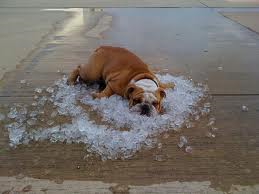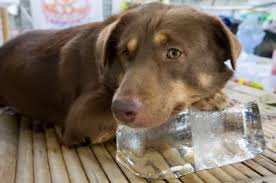
What is Pyometra?
Pyometra is a severe uterine infection, causing inflammation and the accumulation of pus in the uterus, which occurs in entire female dogs and cats and can happen at any age. However, there is a higher chance of it occurring in older animals, especially when they go through several estrus cycles (heat) without becoming pregnant, as the changes to the uterine wall can further promote the disease. Pyometra is a highly seriously condition that requires immediate and aggressive emergency pet care at a 24 hour vet clinic. If left untreated, pyometra can be fatal.
Pyometra is the result of bacteria gaining access to the uterus through the cervix, which is normally tightly closed except for when the animal is in season. When pregnancy does not occur during the heat cycle, especially for multiple cycles, the lining of the uterus begins to thicken and will keep doing so each cycle, which will often result in cysts forming. When the uterus is normal, the invading bacteria are easily eradicated. However, when the uterus becomes thickened and cystic, it creates the perfect environment for bacteria to thrive, which leads to infection and the animal becoming seriously ill.

The clinical signs of pyometra will generally show between 6-8 weeks after heat, but the signs vary depending on the type of the disease that is present. There are two types of pyometra:
- Open pyometra – meaning the cervix is open and pus can drain from the uterus, creating an obvious vaginal discharge
- Closed pyometra – meaning the cervix is closed and not allowing pus to drain, making it more difficult to diagnose
The main clinical signs that pet owners need to be aware of are:
- Increased drinking and urination
- Lethargy and depression
- Vomiting and diarrhoea
- Fever
- Vaginal discharge (Open pyometra only)
- Frequent licking/cleaning of vaginal area (Open pyometra only)
If pet owners ever notice their animal displaying any of these signs, they need to contact a 24hr veterinarian immediately, as deterioration can occur very rapidly.
Animals that are brought in early may only display slight vaginal discharge and no other clinical signs. However, most pets are brought in when the disease is more advanced and showing additional signs. In order to diagnose pyometra, 24hr emergency vets will need to examine the pet’s medical history and perform a physical examination and diagnostic tests, such as x-rays, ultrasounds and blood tests.
The main treatment for pyometra is to firstly stabilise the pet with IV fluids and pain relief, and then surgically remove the infected uterus. The surgery is very similar to a routine spey (ovariohysterectomy) and has a high success rate if animals are brought in early. However, it is often more complicated due to the pus in the uterus causing risk of further infection in the abdomen (peritonitis).
After surgery, pets will need to remain in a 24 hour pet hospital for several days for ongoing monitoring and intensive care. After this time, pets will then be sent home with pain relief and antibiotics and will need to rest for a few days and be closely monitored. They will also require a follow up appointment at the veterinary clinic in 10-14 days to remove the sutures.
The alternative treatment of pyometra is a medical approach, but this is rarely recommended due to being quite complex and having a high chance of nasty side-effects occurring. The medical treatment also has a low success rate and pyometra is likely to occur again after the pet’s next season.
Animal Accident & Emergency have two 24 hour pet emergency centres in Melbourne, which are ideally located in Essendon and Point Cook and both with easy freeway access and amble parking. Our emergency vet clinics operate 24 hours a day, 365 days a year (including public holidays), and offer all the latest equipment and state of the art technology, as well as a 24 hour intensive care unit. Our dedicated team of emergency vets and nurses provide the highest standards of emergency vet care, critical care medicine and surgery, and are experienced in treating all emergencies from right across Melbourne, Geelong and Ballarat. So when you bring your pet to Animal Accident & Emergency you can rest assured that your pet will receive the best and most advanced vet care available.
If you believe your pet may have anaemia or for any emergency, please phone one of our 24-hour Animal Accident & Emergency Centres:
Essendon Fields (03) 9379 0700
Point Cook (03) 8368 7400
Always Open, We Always Care

www.animalemergency.com.au














